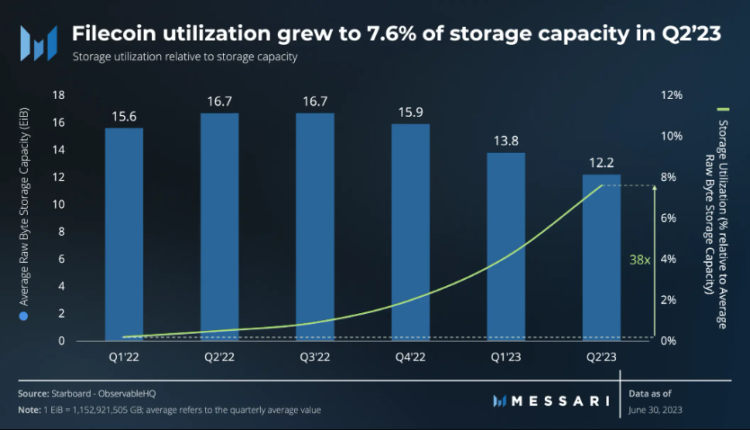According to a July 13 report by Messari, Filecoin currently averages 954.2 pebibytes (1.07 billion gigabytes) worth of storage deals on its network, compared with 12.2 exbibytes (14.1 billion gigabytes) worth of raw storage capacity. Until recently, uptake had been sluggish due to high storage costs compared with centralized alternatives such as Amazon Web Services.
During the most recent quarter, the protocol generated 2.5 million of its own Filecoin (FIL) in revenue, amounting to $11.5 million, representing a decline of 40.7% compared to last year’s second quarter in dollar terms. However, the decline was partly due to a sharp drop in the price of FIL tokens due to the 2022 cryptocurrency bear market, which was somewhat offset by the sharp increase in active storage deals.
The price plunge also affected supply-side revenue, or money earned from block rewards, anchored storage deals and transaction tips. Supply-side revenue fell 66.9% year-over-year to $85.7 million in Q2 2023.
In addition, many storage providers had begun charging near-zero fee storage to incentivize adoption. A vast majority of stored data stems from the information technology sector (41%), followed by natural resources (31.3%), healthcare (16.7%) and social services (9.2%). A total of 1,750 clients have onboarded data onto Filecoin. Researchers also wrote:
“To serve storage retrieval needs, a content delivery network (CDN) for Filecoin and IPFS — called Project Saturn — is currently being developed. Saturn aims to serve Filecoin’s retrieval market through fast and low-cost content delivery.”
Earlier in March, Filecoin released the Filecoin Virtual Machine (FVM), bringing Ethereum-style smart contracts to the network. Since then, over 2,300 smart contracts have been deployed on FVM, consuming 7% of the blockchain’s gas fees in Q2 2023.

Magazine: BlackRock bullish on Bitcoin, Gemini CEO’s ‘delusion,’ and CEXs’ unhappy staff

